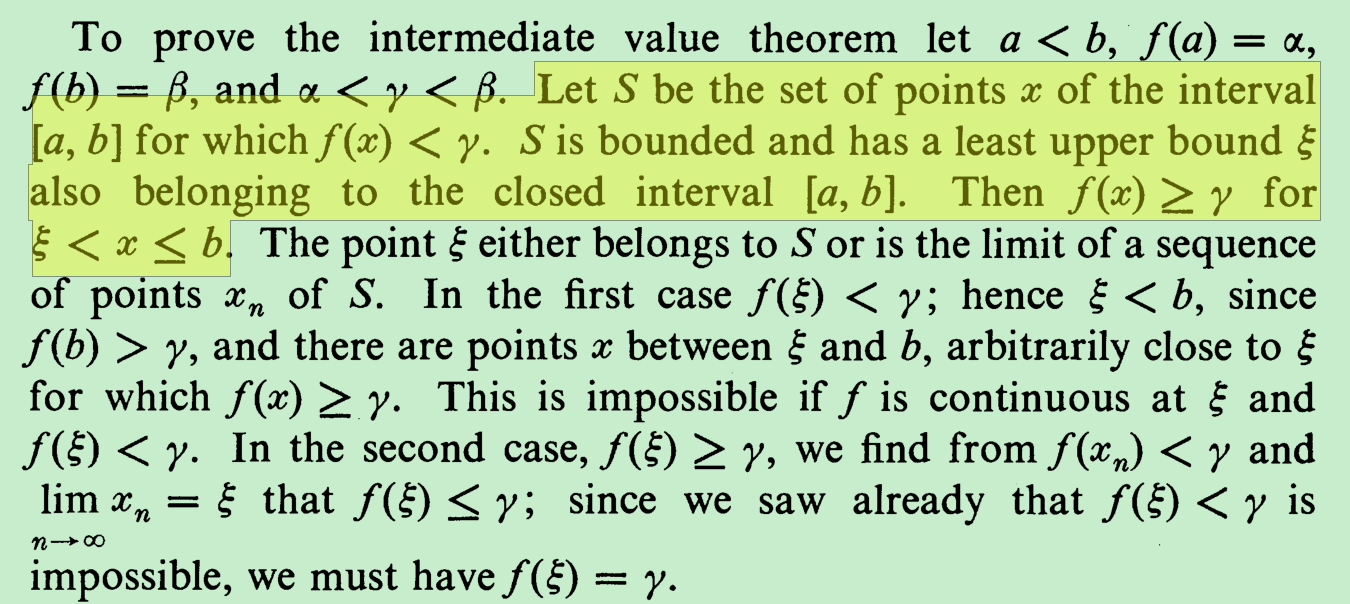A note on trying to extend the intermediate value theorem
First, it is necessary to introduce the following definitions1,
-
The function is said to be increasing at \(x_{0}\) if for all \(x\)-values in some interval about \(x_{0}\) it is true that when \(x_{0} < x\) then \(y_{0} < y\), and when \(x_{0} > x\) then \(y_{0} > y\).
-
The function is said to be decreasing at \(x_{0}\) if for all \(x\)-val ues in some interval about \(x_{0}\) it is true that when \(x_{0} < x\) then \(y_{0} > y\), and when \(x_{0} > x\) then \(y_{0} < y\).
Then the definition of “a function is non-decreasing at \(x_{0}\)” is introduced by extend the definition of increasing above.
-
The function is said to be non-decreasing at \(x_{0}\) if for all \(x\)-values in some interval about \(x_{0}\) it is true that when \(x_{0} < x\) then \(y_{0} \leq y\), and when \(x_{0} > x\) then \(y_{0} \geq y\).
The intermediate value theorem states:
If \(f\) is a continuous function on a closed interval \(\lbrack a,b\rbrack\), and if \(y_{0}\) is any value strictly between \(f(a)\) and \(f(b)\), that is \(min\{ f(a),f(b)\} < y_{0} < max\{ f(a),f(b)\}\), then \(y_{0} = f(c)\) for some \(c\) in \((a,b)\).
My original conjecture was to extend it to:
If \(f\) is a continuous function on a closed interval \(\lbrack a,b\rbrack\) with \(f(a) < f(b)\), and if \(y_{0}\) is any value strictly between \(f(a)\) and \(f(b)\), that is \(f(a) < y_{0} < f(b)\), then \(y_{0} = f(c)\) for some \(c\) in \((a,b)\) and \(\mathbf{f}\) is non-decreasing at the \(\mathbf{c}\).
But it was said that the Weierstrass function, as a counterexample, is indeed nowhere monotonic, while I still couldn’t understand that. After reading the following proof for the intermediate value theorem2,

I realized I could save the conjecture to:
If \(f\) is a continuous function on a closed interval \(\lbrack a,b\rbrack\) with \(f(a) < f(b)\), and if \(y_{0}\) is any value strictly between \(f(a)\) and \(f(b)\), that is \(f(a) < y_{0} < f(b)\), then there is a \(c = sup(\{ x \mid f(x) < y_{0}\) in \((a,b)\}\)) in \((a,b)\ \)cause \(y_{0} = f(c)\), and such that
in every left neighborhood of \(c\), there is always a \(x'\) such that \(f(x') < y_{0}\).
for each \(x\) in any right neighborhood of \(c,\ y_{0} \leq f(x)\).
A similar argument could be drawn for \(f(a) > f(b)\).
The following two functions, which are both differentiable and continuous in neighborhoods around 0, are helpful for my consideration about the question.
\[ f(x)=\left\{\begin{aligned} x^{2} \sin \frac{1}{x}, & \text { if } x<0 \\ x^{2}, & \text { if } x \geq 0 \end{aligned}\right. \]
![Plot[Evaluate[Piecewise[{{x^2 Sin[1/x], -0.5 < x < 0}, {x^2, 0 <= x < 0.5}}]], {x, -0.5, 0.5}]](https://img2022.cnblogs.com/blog/1039027/202205/1039027-20220521163901260-57204427.png)
\[ f(x)=\left\{\begin{aligned} -x^{2}, & \text { if } x \leq 0 \\ x^{2} \sin \frac{1}{x}, & \text { if } x>0 \end{aligned}\right. \]
![Plot[Evaluate[Piecewise[{{-x^2, -0.5 < x <= 0}, {x^2 Sin[1/x], 0 < x < 0.5}}]], {x, -0.5, 0.5}]](https://img2022.cnblogs.com/blog/1039027/202205/1039027-20220521163901261-1650953879.png)

 浙公网安备 33010602011771号
浙公网安备 33010602011771号
